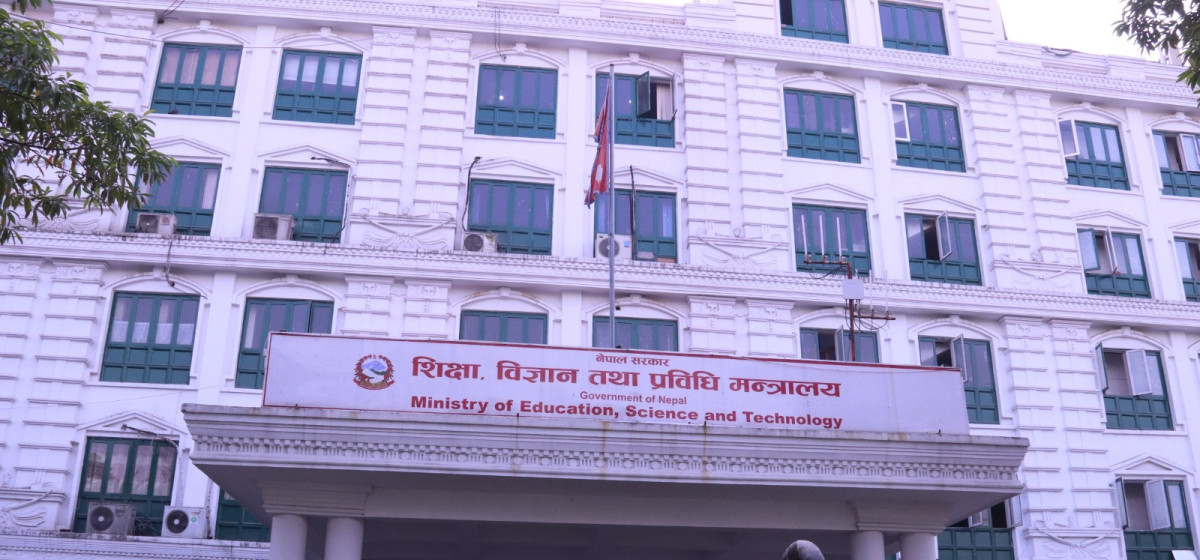KATHMANDU, June 17: The Ministry of Education, Science, and Technology (MoEST) has proposed that the Secondary Education Examination (SEE) should be retained in its current form.
During a discussion held in the parliamentary Education, Science, and Technology Committee, Education Minister Raghuji Pant stated that the Grade X examination is essential to maintain the quality of school education. Based on this, the ministry submitted a written proposal to continue the SEE, according to Nilkantha Dhakal, the ministry’s information officer and under-secretary.
Earlier, a subcommittee under the parliamentary party had submitted a report to the Education Committee recommending the cancellation of the SEE, arguing that it was no longer necessary at the Grade 10 level.
Minister Pant submitted the proposal to the committee on Sunday, which was prepared after discussions with the Nepal Teachers' Association (NTA) and includes 33 key points.
“To improve the quality of teaching and learning for children in school education, the development of reading and writing habits is necessary. For this, SEE examination at Grade X is mandatory,” said Under-Secretary Dhakal, “Since school education falls under the authority of local municipalities, the MoEST proposes that the management and administration rights of the Grade VIII examination remain with the municipalities, while the rights for the SEE examination should be given to the provincial level.”
Nepal Council for Standards approves shoe quality standards for...

He added, "Since the Department of Education is the body responsible for implementing education laws, there is also a proposal to maintain the Department of Education. Additionally, as the District Education Office is necessary to advance educational activities in the district, the ministry has proposed to keep the District Education Office as well.”
According to Tula Thapa, General Secretary of the NTA, making the SEE exam mandatory is a top priority for improving the quality of school-level education.
“In discussions with the ministry, the NTA agreed that the SEE should remain compulsory, the District Education Office should be maintained, and the department responsible for implementing education laws should continue to exist. Based on this consensus, the ministry made its proposal,” said General Secretary Thapa.
However, he added, “The bill still does not address important issues such as teachers’ job security, promotions, and problems faced by primary-level teachers as agreed.” He said, “The NTA feels that many of its demands agreed upon with the ministry have not been addressed, and this is unacceptable.”
Shakilal Bishwakarma, coordinator of the Education Subcommittee, told Republica that many educational issues were discussed in detail within the subcommittee, but mainly the matters related to private schools and early childhood teachers have become challenges. Therefore, the subcommittee submitted a report to the committee for broader discussion.
“The subcommittee focused its discussions mainly on the provision of transferring private schools to guthis (trusts) and on integrating early childhood development teachers into the school structure,” said Coordinator Bishwakarma, “However, the report was submitted to the committee for a wider discussion.”
The parliamentary subcommittee submitted a 53-page report on the School Education Bill to the House of Representatives' Education, Health, and Technology Committee. In the report, the subcommittee put aside issues related to private schools refusing to transfer to public guthis (trusts). Additionally, since the Ministry of Finance has been unable to arrange financial management for early childhood development teachers, these topics are to be further discussed by the committee.
According to the agreement with the NTA, the School Education Bill is expected to be issued by June 29, but so far, comprehensive discussions on the issues have not taken place in the committee. The transformation of private schools into educational guthis and the job security of early childhood teachers have become complex and sensitive matters.
Co-chairperson of the NTA, Nanu Maya Parajuli, stated that the government has not yet included the agreed-upon issues with the federation in the proposed Education Bill.
“If the Education Bill does not address the demands of teachers by June 29, another phase of the movement will be announced,” Co-chairperson Parajuli said, “Problems faced by school staff and early childhood teachers have remained unresolved for years. They are deeply frustrated.”
She added, “Our firm stance is that the bill must include provisions for the job security of early childhood teachers and school staff as agreed with the NTA. Additionally, the SEE must be maintained as it is, and the District Education Office and Education Department must be retained.”












_20230205122050.jpg)

























